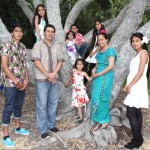While I was pulling some weeds in our front yard, a voice piped up:
“Hi there, can I help you with anything?”
I looked up, startled by two men in suits.
“We’re missionaries for the Church of Jesus Christ of Latter-Day Saints.”
And that was the start of my 2-month journey of sharing the gospel with, and learning from, two Mormon missionaries from Utah.
Here are some things I learned from interacting with Elders Burdick and Muhlestein:
- In New Zealand, the LDS have between 200 and 250 full-time missionaries spreading Mormonism from door-to-door to anyone that will listen.
- These missionaries are usually young adults aged between 18 and 25. In our case, one was 20 and the other was 21. They basically work 16 hours a day, 7 days a week for two years, and must fund their own mission.
- They have a lot of rules that they must obey to gain the “highest level of heaven”, and so they are burdened by rules and regulations. For example, while on mission, they have to stay with their companion 24/7, are banned from TV, radio, movies, books, magazines, newspapers and computers except for LDS-related stuff. I really felt sorry for the weight of the Law they were under.

Initially, these missionaries were really open to reading the Bible (they use the KJV), so we did just that and I was able to explain the gospel when we hit passages such as Eph 2:1-10, 1 Cor 15 and others like it. What a golden opportunity presented when the people you are reaching out to already have Bibles in their hands!
We were able to discuss in detail what the Bible taught about Jesus and what his good news was. I found that you had to ask them to explain what they meant with each term they used, because although Mormons use the same language as Christians, they have a different (and false) definition to each term. This includes the words gospel, grace, salvation, heaven, saved, God, priesthood, atonement and so on. If we assumed the meaning to these words it would sound like we were agreeing to the same things (e.g. “We are saved by Jesus Christ’s atonement”), but meaning very different things!
So it took more questions and more time, but we talked through each term and how the Bible defines them vs. how the Mormon scriptures do. To counter their low view of the authority of the Bible (it’s helpful to them only as far as they deem it to be correctly translated) I wanted them to see that the Bible could provide all they needed to know (2 Tim 3:15-16). Each week I tried to leave them with the fact that the Bible taught things very differently to their other scriptures, and why it was important to understand and believe that.
I also realised that actually, we should explain Bible terms and concepts to anyone we talk to about Jesus, instead of assuming terms. For example, explaining the term Son of God — with its adoptive and inheritance-filled meaning of sonship — would be crucial for Muslims who confuse it with a biological meaning. Similarly, explaining the term gospel is really important for those who confuse it with a musical genre, or have different connotations to it.
After about 8-10 evenings of opening the Bible together, eventually I got a letter from the Mormons (no emails allowed!) saying that “we should turn our discussions’ focus more toward the Book of Mormon than we have” – and then they eventually stopped meeting us altogether.
Nevertheless, my hope is that God used the time we spent in the Word to put an unshakable stone in their shoes. Perhaps one day back in Utah, they’ll remember hearing about a gospel message that offered them true hope and security for eternal life, and turn to that instead of the Mormonism they grew up with.
Along the way, I found it really helpful to put into practice several helpful suggestions from a former LDS, John Divito. I think these points would be just as applicable when reaching out to anyone who to any person you would like to reach out to:
- love your Muslim/Jewish/Catholic/atheist/agnostic/hedonist neighbour – I initially felt really awkward even considering having Mormons in my house, and thought of them in stereotypes and pop musical-related characterisations. I had to repent of that and extend love to Elders Burdick and Muhlestein in order to share the gospel with them.
- recognise their need for Christ – As I spent time with these two, it became really apparent that they needed real assurance, and I pleaded with them to accept that the gospel was not about “doing” but was about what Christ had already “done”. So many of us have this same misunderstanding ourselves!
- study their worldview/faith/culture – I found it helpful to read (discerningly) certain LDS-related materials to understand their unique culture and where their false teachings originate (e.g. Articles of Faith, Book of Mormon, Doctrines and Covenants, Ensign – all freely available online). If you were to reach out to anyone, it’s certainly wise to understand their culture and worldview.
- treat them individually – Yet with the abundance of resources online, it was very easy to start critiquing and debating Elders Burdick and Muhlestein based on what the websites said Mormons believed, rather than asking them what they individually believed, then responding in light of the truth from God’s Word. I had to correct myself several times when I would assume they believed something erroneous when it turned out they didn’t.
- pray for their salvation and have confidence in Jesus – I love these points by John Divito:
“While we may be tempted to trust in our own abilities when evangelizing a Mormon, we must trust in God to give faith to those who hear the gospel. This critical truth must never be overlooked.”
“The salvation of Mormons is no more difficult for God than that of any other unbeliever. We should faithfully proclaim the gospel to Mormons, trusting in Christ to draw them to himself. Let us rest in his strength to save Mormons for his glory!”
If you can, please join me in praying for Elders Burdick and Muhlestein to know and rest in Christ alone for eternal life!
————————-
More thoughts: http://solapanel.org/article/what_i_learned_from_the_mormons/






As I was searching some words, I came across your website. I am a Mormon from Mongolia. Served a mission in Utah. I felt prompted to share this http://mormon.org/what-do-mormons-believe